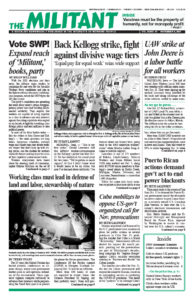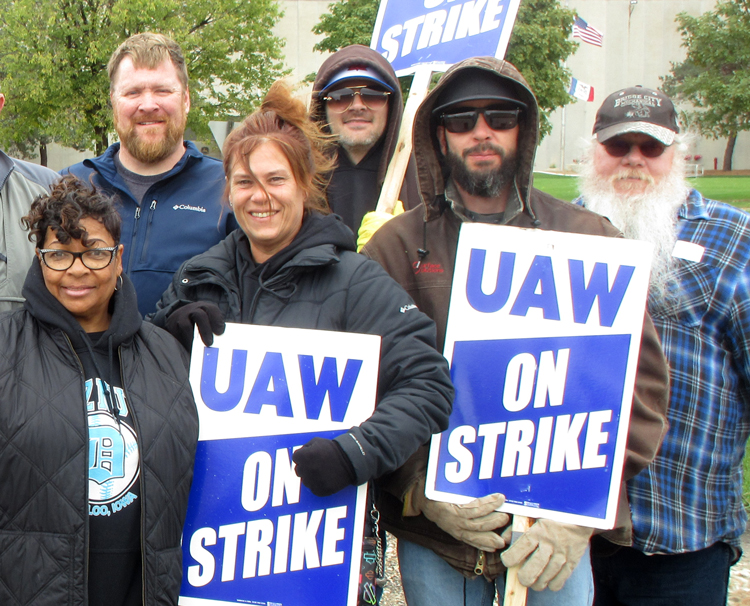As we go to press . . .
On Oct. 27 Richard Rich, a member of UAW Local 79, was hit by a car and killed as he crossed over to join the picket line at the Deere parts distribution center in Milan, Illinois. The Militant joins the union in honoring his life as the strike continues.
WATERLOO, Iowa — The hall of United Auto Workers Local 838 here was teeming with striking union members Oct. 21. They were signing up for medical insurance being provided by the local and taking advantage of the strike cafeteria, staffed by union members, where they can get free meals.
More than 10,000 UAW members are on strike at John Deere’s 14 agricultural and construction equipment plants, most in Iowa and Illinois. They had voted by 90% to strike beginning Oct. 14 when the bosses refused to back off attacks on their pay, benefits and working conditions. Key issues include company demands to expand to three divisive tiers of pay and benefits.
This Militant worker-correspondent came here with Mark Severs, a member of Teamsters Local 638 in Minneapolis. Severs had worked with Teamsters Local 120, also based in Minneapolis, to bring down cases of water and boxes of snacks for the strikers’ picket shacks.
Strikers at the Local 838 union hall told us similar donations were coming in from all over the area.
“We’ve gotten monetary and food donations, firewood and material for constructing weatherproof huts for each picket site,” Paul Jungen II, the local’s financial officer, told us. Kirk Drape, one of the union vice presidents, explained that there are 3,100 Deere workers in Local 838. He said they’ve set up nine picket shacks covering the company’s five plants in Waterloo. And that workers will get $275 weekly strike pay as they staff picket lines, or help out on other strike-related duties.
Hundreds of strikers and their supporters rallied outside the Local 838 hall Oct. 23, cheering, chanting and listening to other unions and local politicians — many who have relatives who worked for Deere — offer solidarity.
“Your fight here, your strike — when you voted 10,000 strong to go out the door and do what was right to protect future generations of John Deere workers and UAW workers, it wasn’t just for them,” Rick Moyle, executive director of the Hawkeye Area Labor Council, told the rally. “It was for the entire movement. It was for every working family, not only in the state of Iowa, but in the United States.”
“There’s been a resurgence in union power, and it’s what is needed at this time,” Phillip Sanchez, a Mason City farmer and member of Teamsters Local 238, said.
Waterloo Mayor Quentin Hart joined the rally. The five members of the Board of Supervisors of Black Hawk County, where Waterloo is located, issued a proclamation supporting the strike.
After the rally participants fanned out to augment picket lines at the plants.
Deere bosses feel some pressure. They put out a news release the day before the rally announcing they will continue to provide health care for the strikers.
At the same time, they got a compliant judge in Davenport, south of here, to issue a draconian restraining order limiting UAW Local 281 members picketing Deere there. The injunction, issued by Chief Judge Marlita Greve, restricted workers picketing “near the gates” to four. As winter approaches, she barred bonfires of any kind and strikers bringing chairs to the picket line. She prohibited picketing or congregating “near the contractor gate entrance.”
Fight for dignity, future generations
Kayla Schaefer, who has worked 10 years at John Deere and is a member of the local’s Women’s Committee, took us to meet some of her co-workers at one of the picket lines. “I used to see people on strike when I was younger and never dreamed that I would be in this situation,” she said. “But sticking together makes us stronger and it will help us get what we’re asking for.” She told us that women make up 20% of the workforce at Deere.
Workers at this picket line told us “the union gave concessions in the 1997 contract, including approving a two-tier system. Now the company wants a third tier for new workers. They wouldn’t get a pension like we do, and their insurance benefits would cost them more.”
They pointed out the company is making money hand over fist, and tells the press it expects 2021 net income will be between $5.7 and $5.9 billion.
As we visited another picket line, donated wood frames were being dropped off to assemble weatherproof shacks. The same thing was happening at all the other picket sites.
Strikers told us that a number of workers at the plant also labor after-hours on their own farms. News media has been helping Deere bosses try to pit farm families against the strikers, as the strike is taking place while many farmers are harvesting their crops.
Minnesota farmer Brian Brekken was quoted by KTTC-TV in Rochester, Minnesota, as saying, “Before, when John Deere had machines down, you get the parts the next day. Now they’re saying that’s not going to happen.
“So, if one of these went down and we can’t get the part, you know, we’ll be sitting.”
On another picket line we talked to David Smith, who has worked for John Deere for 18 years. “We need to stand together with our numbers and we are in this for the long haul,” he said.
“Deere tries to keep us divided with the different tiers,” Smith said. “What if my kids want to work here? Why should they get lower pay, little benefits and no pension? We’re doing this for them.”


